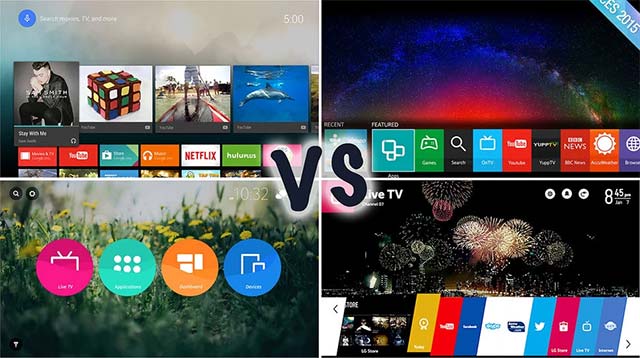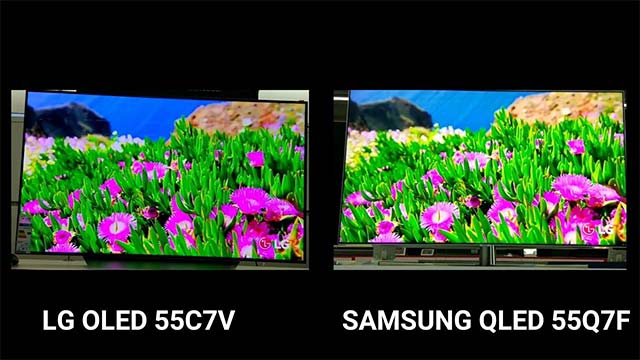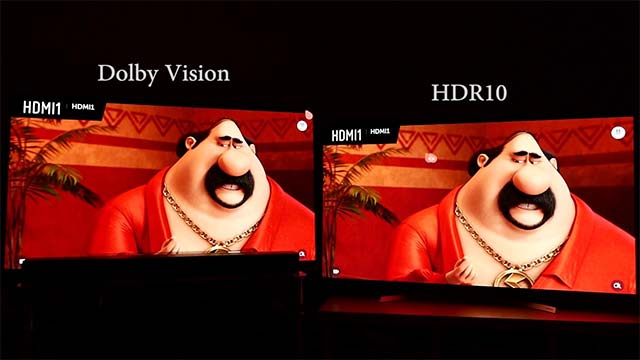Samsung and LG - which brand should I buy?
The current TV market is extremely large with a multitude of products of all sizes, shapes, features, prices, coming from many different productions, making buyers sometimes overwhelmed. Among the major TV makers today, Samsung and LG have emerged as the market leaders with countless innovations in both design and features, so their products are extremely used. period, especially in the Vietnamese market.
However, choosing a Samsung or LG TV is really a difficult problem, because these two manufacturers have a lot in common: They are long-standing brands from Korea, all with the most advanced technology, and there are products in all price segments. So how to make the most appropriate choice. Here are some comparison criteria to help you get a more objective view of TV products coming from these two manufacturers.
Smart TV: Tizen and webOS operating systems
It can be said that the operating system is the soul of any electronic product, so is the smart TV. Both Samsung and LG use their own proprietary smart TV operating system platforms, and each has its own unique flavor.
LG has been focusing on webOS development since 2014, with the uniqueness lies in the options menus for applications, streaming services, and commonly used input connections. Along with that is the ability to customize for users to choose their favorite application location on the control panel. The latest version of webOS 4.5 has the addition of extra menus that appear when the user hovers the mouse over the application icon, offering many useful options.

Samsung's Tizen platform has no major features or emphasis in interface layout (you might be confused with other operating systems), and it doesn't have the impressive search algorithm like built-in AI software. case of LG. However, the experience is basically not bad, with the options displayed clearly, the transition interface is also quite smooth.
About a feature that is also very important on smart TVs today is the voice assistant, LG is slightly better when integrated Google Assistant, while Samsung uses Bixby (although there is still the option to use Google Assistant or Alexa. via third party devices).
QLED or OLED?
Today, the high-end TV market is classified by display panel technology: OLED and QLED (basically LED-LCD screens with quantum dots).
OLEDs are the type of display panel that can emit its own light, instead of having to shine in to display information. This allows the TV screen to have excellent thinness and the ability to control brightness on each pixel. OLED displays are known for their vibrant colors, deep black levels and low overall brightness.
All OLED panels in the world today are manufactured by LG Display, so even if you have a Sony OLED in your home, you should thank LG.

On the other hand, QLED is a proprietary technology developed by Samsung that uses quantum dot filters to enhance color and contrast, while also incorporating some blurry areas to change the brightness on the screen. image - instead of being able to do so with individual pixels like OLED. As a result, QLED TVs offer a much better maximum brightness than OLED (thousands of nit compared to hundreds).
In general terms, it seems that the ability to display sharp colors of QLED is slightly better than OLED, but not too significant. In addition, both technologies are improving over time.
Dolby Vision and HDR 10+
Both manufacturers have slightly different orientations for high dynamic range (HDR), with LG incorporating Dolby Vision technology into high-end OLED and Super UHD panels, while Samsung prefers HDR10 + TV models. " signature ".
Both formats use the so-called "dynamic metadata" to adjust the output of the TV according to the displayed content, so the dark or light scenes will be changed more flexibly, with the corresponding contrast and image processing capabilities.

Dolby Vision is actually a more advanced format, with 12-bit color gamut, compared to 10 bits of HDR 10+, and is also more commonly used. However, it must be affirmed that HDR formats are really a concern only for premium-priced products, along with other supported projection service packages.
Samsung vs LG TVs: which one should you choose?
Samsung is still the market leader and is likely to continue to maintain this position with its own hybrid-OLED plan, to surpass LG's OLED technology. However, introducing 48-inch panel sizes for LG's OLED TVs could help the manufacturer threaten Samsung's mid-range segment when it launches this year.
In general, these two manufacturers will constantly improve technology so that no one can become too superior to the other. Therefore, your decision will probably be more inclined to the style as well as the specific price you are aiming for.
If you want a super bright, bright QLED display to light up your entertainment, Samsung's options are the best option you should consider.
If you really want the most impressive picture quality available, regardless of price, there's currently nothing surpassing LG's OLED panels in terms of color and contrast.
Wish you choose the most satisfactory TV!